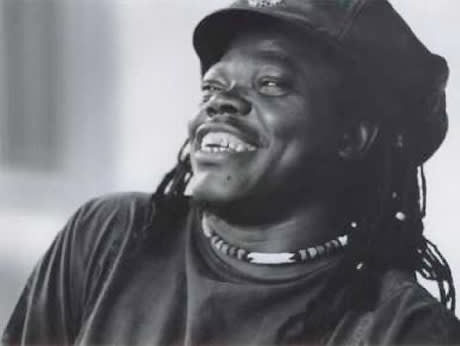Tanzanian music star Remmy Ongala died in Dar Es Salaam at the age of 63 earlier this month on December 12. Ongala had been ill with various ailments including diabetes and kidney disease, and had suffered recent strokes according to his son Thomas but the exact cause of death has not been disclosed.
Ongala was an extremely popular musician throughout East Africa during the '80s and '90s, and toured intercontinentally on the strength of his association with the WOMAD (World of Music Arts and Dance) festival and Real World music label, both projects of Peter Gabriel. Ongala's album Songs for the Poor Man (1989) was one of the label's first releases, and as such generated considerable international critical attention especially on the strength the Africa-wide hit "Kifo" (meaning "death"), which remained Ongala's best known song.
Born Ramadhani Mtoro Ongala in D.R. Congo, Ongala's first musical activity occurred in the mid-1960s when he joined up with the Bantu Success Youth Band. After scuffling for a few years in bands influenced by Congolese guitar icon Franco, he joined the popular Orchestra Makassy in Tanzania by the late 1970s. Makassy contributed to the emerging wave of soukous ensembles, a Congolese form which would be one of the most popular African rhythms of the next two decades. Ongala split from Makassy in 1980 to form Orchestra Super Matimala, which played soukous among many other styles.
Upon hooking up with Real World in the late '80s, Ongala became one of the few East African artists to have any distribution in Europe and North America. His extensive touring brought him to Canada and the United States as part of the first round of WOMAD live events during this time.
There has been some debate over whether this era of his career was entirely positive, as Afropop Worldwide notes, "Some observers feel that the WOMAD experience disrupted Ongala's music, forcing him to slim down his lineup, shorten his shows and favour a more soukous-oriented approach." Nevertheless he remained popular in Tanzania, to the point where the suburb in which he lived -- Sinza Kwa Remmy -- was named after him.
His declining health curtailed his musical activities over the past ten years. However, he was still touring Tanzania, albeit playing gospel, until recently.
Ongala is survived by his wife and four children.
Ongala was an extremely popular musician throughout East Africa during the '80s and '90s, and toured intercontinentally on the strength of his association with the WOMAD (World of Music Arts and Dance) festival and Real World music label, both projects of Peter Gabriel. Ongala's album Songs for the Poor Man (1989) was one of the label's first releases, and as such generated considerable international critical attention especially on the strength the Africa-wide hit "Kifo" (meaning "death"), which remained Ongala's best known song.
Born Ramadhani Mtoro Ongala in D.R. Congo, Ongala's first musical activity occurred in the mid-1960s when he joined up with the Bantu Success Youth Band. After scuffling for a few years in bands influenced by Congolese guitar icon Franco, he joined the popular Orchestra Makassy in Tanzania by the late 1970s. Makassy contributed to the emerging wave of soukous ensembles, a Congolese form which would be one of the most popular African rhythms of the next two decades. Ongala split from Makassy in 1980 to form Orchestra Super Matimala, which played soukous among many other styles.
Upon hooking up with Real World in the late '80s, Ongala became one of the few East African artists to have any distribution in Europe and North America. His extensive touring brought him to Canada and the United States as part of the first round of WOMAD live events during this time.
There has been some debate over whether this era of his career was entirely positive, as Afropop Worldwide notes, "Some observers feel that the WOMAD experience disrupted Ongala's music, forcing him to slim down his lineup, shorten his shows and favour a more soukous-oriented approach." Nevertheless he remained popular in Tanzania, to the point where the suburb in which he lived -- Sinza Kwa Remmy -- was named after him.
His declining health curtailed his musical activities over the past ten years. However, he was still touring Tanzania, albeit playing gospel, until recently.
Ongala is survived by his wife and four children.
